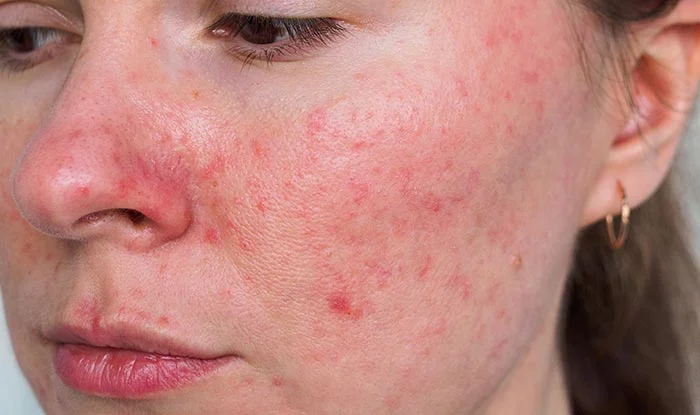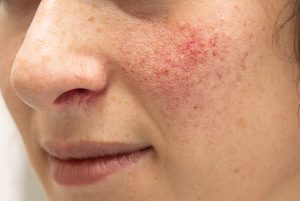Rosacea
What is Rosacea?
Rosacea is a chronic skin condition that primarily affects the face. It is characterized by redness, flushing, visible blood vessels, and sometimes the development of small, red, pus-filled bumps or pustules. The condition usually starts with intermittent flushing or redness on the cheeks, nose, chin, or forehead, and it may progress over time if left untreated.
The exact cause of rosacea is not fully understood, but it is believed to be a combination of genetic, environmental, and vascular factors. Some triggers that can exacerbate rosacea symptoms include exposure to sunlight, certain foods, alcohol, hot or spicy beverages, temperature changes, stress, and some medications.
WHAT CAUSES ROSACEA?
The exact cause of rosacea is not fully understood, but it is believed to result from a combination of genetic, environmental, and vascular factors. Several factors may contribute to the development of rosacea:
Genetics: There is evidence to suggest that rosacea may run in families, indicating a genetic predisposition to the condition. Certain genetic variations may make some individuals more susceptible to developing rosacea than others.
Abnormal blood vessel response: Rosacea is associated with abnormal blood vessel dilation (vasodilation) in the skin. This leads to the characteristic flushing and redness observed in affected individuals. The triggers for vasodilation are not entirely clear, but they may include environmental factors, such as temperature changes, sunlight exposure, and certain foods or beverages.
Immune system dysfunction: Some researchers believe that an overactive or dysfunctional immune response in the skin may play a role in rosacea. This could explain the inflammation and inflammatory lesions seen in the condition.
Demodex mites: These are microscopic mites that normally live on human skin, particularly in the facial area. In people with rosacea, it is suggested that there may be an abnormal increase in the number of these mites or an exaggerated immune response to their presence, contributing to the development of the condition.
H. pylori infection: Some studies have proposed a possible link between Helicobacter pylori infection, a bacterium that can cause stomach ulcers, and the development of rosacea. Also low stomach acid!
Environmental and lifestyle triggers: Certain environmental factors and lifestyle choices can exacerbate rosacea symptoms. These triggers can include exposure to sunlight, extreme temperatures, hot or spicy foods, alcohol consumption, emotional stress, and certain skincare products.
It’s important to note that while these factors may contribute to the development and exacerbation of rosacea, the condition is complex and can vary from person to person. As a result, not all individuals with rosacea will experience the same triggers or respond to treatments in the same way.
different types of ROSACEA
There are four main subtypes of rosacea, each presenting with different symptoms:
Erythematotelangiectatic rosacea / Subtype 1: Characterized by redness and visible blood vessels (telangiectasia) on the face, along with flushing and a tendency to be more reactive to triggers.
Papulopustular rosacea / Subtype 2: In addition to redness and flushing, this subtype includes the appearance of small red bumps (papules) and pus-filled pimples (pustules) on the affected areas.
Phymatous rosacea / Subtype 3: This subtype is characterized by thickening of the skin and irregular surface nodules, usually on the nose (rhinophyma), but it can also affect other areas of the face.
Ocular rosacea/ Subtype 4: This type affects the eyes, causing symptoms such as redness, dryness, burning, itching, and sensitivity to light. If left untreated, it can lead to more severe eye complications.
DOES DIET & LIFESTYLE IMPACT ROSACEA?
Yes, diet and lifestyle can significantly affect rosacea. Certain foods, beverages, and lifestyle choices can act as triggers, exacerbating the symptoms and leading to flare-ups in individuals with rosacea. While the specific triggers can vary from person to person, common dietary and lifestyle factors that may affect rosacea include:
Spicy foods: Consuming spicy foods can cause blood vessels to dilate, leading to increased facial redness and flushing in some individuals with rosacea
Hot beverages: Hot drinks, such as coffee, tea, and hot chocolate, can trigger flushing and exacerbate rosacea symptoms in some people.
Alcohol: Alcoholic beverages, especially red wine and certain spirits, have been known to trigger rosacea flare-ups in some individuals, possibly due to their vasodilatory effects.
Temperature extremes: Exposure to hot weather, saunas, hot baths, or overly warm environments can lead to flushing and increased redness in individuals with rosacea
Sunlight and UV exposure: Sun exposure is a common trigger for rosacea, and individuals with the condition are often advised to wear sunscreen and protective clothing to minimize the effects of UV radiation on their skin.
Emotional stress: Stress and anxiety can contribute to rosacea flare-ups. Managing stress through relaxation techniques or counseling may help reduce symptoms.
Skincare products: Certain skincare products containing irritants or harsh chemicals can worsen rosacea symptoms. It is essential to choose gentle, fragrance-free products suitable for sensitive skin.
Physical exertion: Strenuous exercise or activities that cause overheating and sweating can trigger rosacea symptoms in some individuals.
Smoking: Smoking is associated with increased inflammation and can worsen rosacea symptoms.
Medications: Some medications, such as vasodilators and certain blood pressure drugs, can exacerbate rosacea symptoms in some individuals.
Demodex mites: As mentioned earlier, an overabundance of Demodex mites on the skin may be associated with rosacea flare-ups in some people.
It’s important for individuals with rosacea to identify their personal triggers and make appropriate lifestyle modifications to manage their condition effectively. Keeping a diary to track flare-ups in response to various factors can help pinpoint specific triggers.
CAN YOU HAVE ROSACEA TREATMENTS WHILE PREGNANT?
When pregnant, this does limit you on what treatments and active ingredients you can use in products, but with that being said, here at SBCM, we offer the BYONIK PTL laser device, which is our go-to for Rosacea and is safe to use while pregnant and breastfeeding.
Ready to begin your journey?
If rosacea is a concern for you, we can help. Get started today, click the link below.
Want to know the tea?



